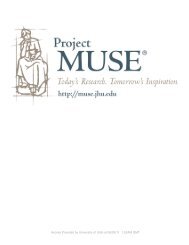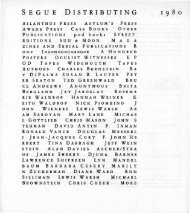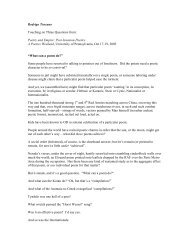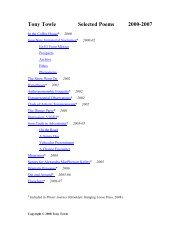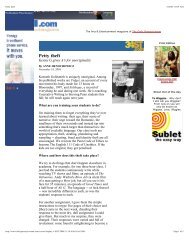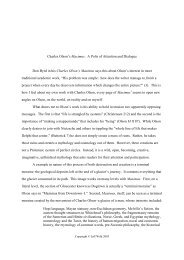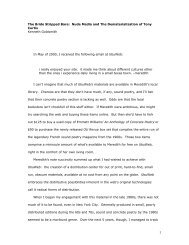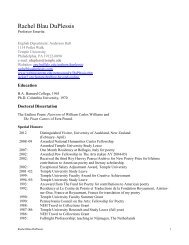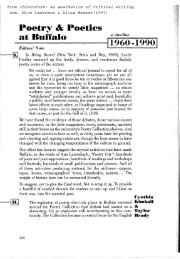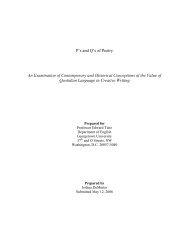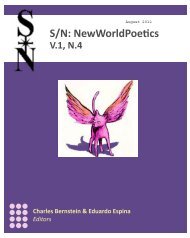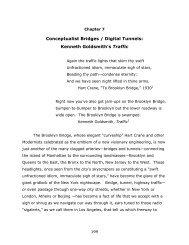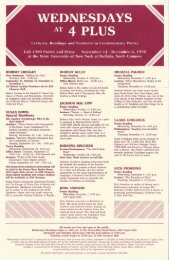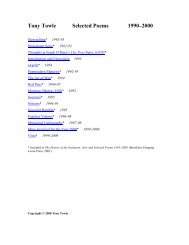Preface - Electronic Poetry Center
Preface - Electronic Poetry Center
Preface - Electronic Poetry Center
Create successful ePaper yourself
Turn your PDF publications into a flip-book with our unique Google optimized e-Paper software.
less literate is implied by that "more", I would rather know who is doing the<br />
talking here? Or, to put it another way, who’s the ventriloquist in this instance?<br />
A not uncommon kind of contradiction that appears in negative reviews is<br />
exhibited in Ms Stafford’s aside (to whom, exactly?) "a little Saussurian<br />
reference for the cognoscenti?". It’s hard to take seriously the notion that such a<br />
statement is directed to "the less enlightened reader". If it is, how do they,<br />
outside of, say, an academic environment, understand "Saussurian"? This aside<br />
is also, I’m afraid, directed at a "cognoscenti", and a clear distinction is<br />
therefore implied, like it or not, between the author’s ‘cognoscenti’ and the<br />
poet’s ‘cognoscenti’ - ours and theirs, us and them. But if she is, say, talking to<br />
me (and, after all, I too am a ‘reader’), then I would say that she is not at all up<br />
with the play, either with Saussure (who dealt with spoken, not written<br />
language), or with Heidegger who said "It is in language that things first come<br />
into being and are" (Introduction to Metaphysics), or with Charles Olson’s<br />
reliance on the work of Jane Ellen Harrison for his assertion that myth (the<br />
stories that cultures, oral and literate, tell themselves about themselves) comes<br />
first from the mouth. I introduce these other writers here, not to show off my<br />
naturally immense erudition, but to signal that we all have such reading lists<br />
behind and operative within what we say. For all of us they are different of<br />
course, but we all have these alliances, allegiances and engagements to one<br />
degree or another. They are not the same kind of thing as ‘credentials’. If our<br />
‘reading lists’ are too different, and I am suggesting that this is likely to be the<br />
case as between Ms Stafford and the poets she reviews, then little wonder that<br />
the reviewer finds it hard to connect with the work.<br />
However, it is the outright refusals that I find the most interesting aspect of Ms<br />
Stafford’s review. First, the refusal to be (indeed the specific injunction not to<br />
be) literal – "Don’t be literal". If the literal is the first thing to be denied of<br />
unfamiliar writing, then it’s understandable that a reader might find a grasp of<br />
its metaphorical content hard to come by. If, as Ms Stafford maintains, "a<br />
metaphor should expand meaning" (tho I don’t accept this formulation myself)<br />
then it’s possible that the literal is one of the places from which metaphor can<br />
"expand". It is, in any case, a perfectly reasonable place to begin. That it should<br />
be precluded, requires more explanation than a list of other options, especially<br />
when, for instance, my own teaching experience suggests that it is wise counsel<br />
to keep the options open until they falter – in any given instance.<br />
A further type of refusal is performed in the review when, in discussing<br />
Leggott, the reviewer writes that a particular passage "would be fine if I knew<br />
what the last two words meant". Those two words are "HYDROPHILE



